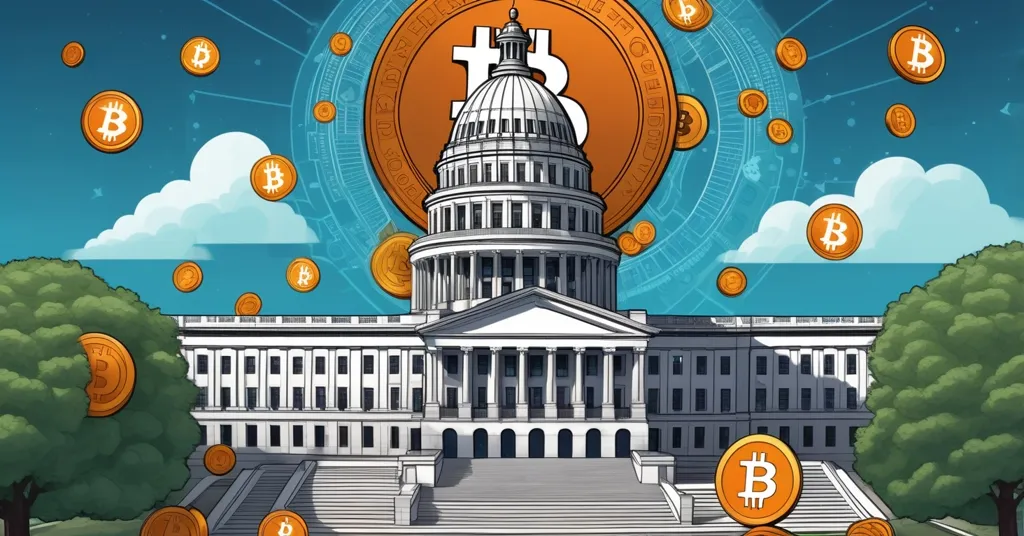South Carolina Proposes $1M Bitcoin Investment with H4256 Bill

South Carolina’s Bold Leap: Proposing a Million Bitcoin Investment
South Carolina is setting the stage for a groundbreaking financial experiment with the introduction of the “Strategic Digital Assets Reserve Act” (H4256). This ambitious bill would empower the state treasurer to allocate up to 10% of certain state-managed funds into Bitcoin and other digital assets, capped at a staggering one million Bitcoins.
- Strategic Digital Assets Reserve Act (H4256) proposed
- Up to 10% of state-managed funds eligible for Bitcoin investment
- Maximum reserve limit set at one million Bitcoins
- Emphasizes security, transparency, and audits
- Residents can contribute digital assets to the state’s reserve
The bill targets the General Fund, Budget Stabilization Reserve Fund, and other state-managed investment funds for potential investment. It’s a clear nod to Bitcoin’s potential as a safeguard against inflation and economic turbulence, as highlighted in the bill’s text:
“Bitcoin, as a decentralized digital asset, and other digital assets offer unique properties that can act as a hedge against inflation and economic volatility. It also helps to diversify the state’s funds.”
This perspective aligns with financial experts who view cryptocurrencies as a novel asset class capable of reducing risks tied to traditional investments.
Security and transparency are at the heart of H4256. The bill mandates that digital assets be held directly by the state treasurer or through a qualified custodian, or via investment vehicles that track Bitcoin’s price on stock exchanges. To foster public trust, the state will publish the public addresses of these assets on its official website, alongside reporting every two years on the holdings and their USD value. Regular independent testing and auditing ensure the integrity of digital asset management.
In a bold move to boost public engagement, South Carolina residents can donate their own digital assets to the state’s reserve. Imagine a local, John, who’s been holding Bitcoin for years. With this new legislation, he donates some of his holdings, contributing to the state’s financial diversification while becoming part of this historic embrace of digital currencies.
Implications for the Crypto Landscape
South Carolina’s legislative push is more than a state-level decision; it’s a reflection of the growing acceptance and legitimacy of cryptocurrencies within traditional financial systems. This move aligns with 24 other U.S. states that have introduced similar Bitcoin reserve bills, signaling a broader trend of states exploring cryptocurrency investments.
The state’s prior engagement with the crypto space through S0163, which focused on regulating digital assets, prohibiting central bank digital currency (CBDC) payments, and promoting crypto mining while addressing concerns like energy consumption and noise, underscores South Carolina’s commitment to navigating the complexities of the cryptocurrency world.
Challenges and Risks
While the optimism surrounding Bitcoin is palpable, it’s crucial to acknowledge the challenges and risks involved. The volatility of cryptocurrencies, potential security breaches, and the need for robust regulatory frameworks are all hurdles that must be addressed. Remember the infamous crypto crash of 2018? That’s the kind of rollercoaster South Carolina might be strapping into. And let’s not even start on security breaches—remember the Mt. Gox debacle?
But let’s play devil’s advocate for a moment: Is this move really a smart long-term strategy? Sure, Bitcoin might hedge against inflation now, but what happens when the next big crypto crashes? And let’s not forget, a million Bitcoins today might not be worth the same in 2035. Are we setting South Carolina up for a financial rollercoaster ride?
Balanced Perspective and Critical Analysis
As we champion the ideals of decentralization, freedom, and privacy, it’s important to maintain a balanced perspective. While Bitcoin maximalists might celebrate this move, it’s essential to recognize the roles that altcoins and other blockchains play in filling niches that Bitcoin might not serve as effectively. The crypto landscape is diverse, and each project brings its own unique value to the table.
Let’s be real, Bitcoin isn’t just another shiny object for states to play with—it’s the game-changer that could shake up the entire financial system. South Carolina is just the latest to jump on this rollercoaster, and we’re here for the ride!
Key Questions and Takeaways
- What is the purpose of the Strategic Digital Assets Reserve Act in South Carolina?
The purpose is to allow the state treasurer to invest in Bitcoin and other digital assets, up to a specified limit, as a way to hedge against inflation and diversify the state’s funds.
- What are the key investment limits set by the bill?
The bill caps investments at 10% of state-managed funds and sets a maximum reserve limit of one million Bitcoins.
- How does the bill ensure transparency and security in managing digital assets?
It mandates secure custody solutions, public disclosure of asset addresses, reporting every two years on holdings in USD, and regular independent audits of management processes.
- Can South Carolina residents contribute to the state’s digital asset reserve?
Yes, residents can donate digital assets to the reserve through an approved vendor process.
- How does this legislative move fit into the broader U.S. trend regarding Bitcoin reserves?
South Carolina joins 24 other U.S. states that have introduced similar bills, indicating a growing trend of states exploring cryptocurrency investments.
- What is the significance of the previous bill S0163 in South Carolina?
S0163 focused on regulating digital assets, prohibiting CBDC payments, and promoting crypto mining, reflecting the state’s prior engagement with cryptocurrency issues.
South Carolina’s proposal is a testament to the evolving landscape of finance, where traditional and digital assets are beginning to coexist. As we navigate this new frontier, it’s crucial to stay informed, engaged, and critical of the narratives that shape our understanding of cryptocurrencies. The future of money is here, and it’s more exciting—and challenging—than ever.



